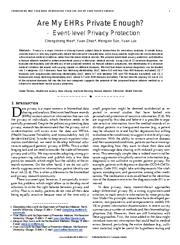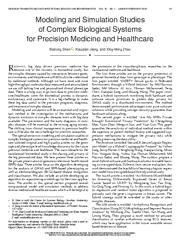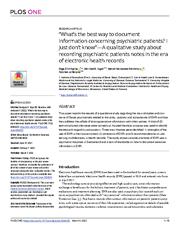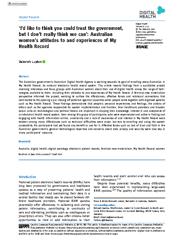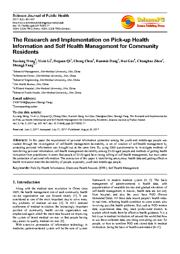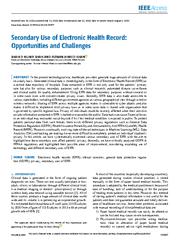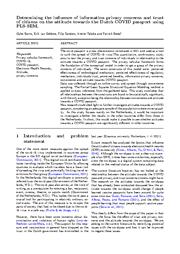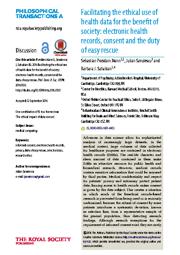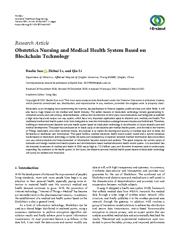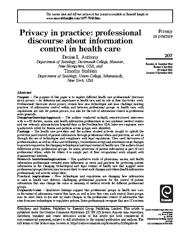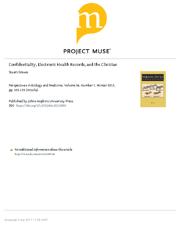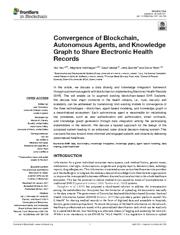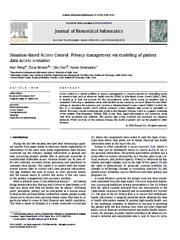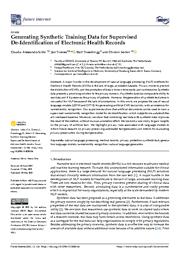A copy of this work was available on the public web and has been preserved in the Wayback Machine. The capture dates from 2019; you can also visit the original URL.
The file type is application/pdf.
Filters
Are My EHRs Private Enough? -Event-level Privacy Protection
[article]
2018
arXiv
pre-print
We propose event-level privacy protection, and develop a feature ablation method to protect event-level privacy in electronic medical records. ...
privacy protection. ...
Area Under the ROC Curve), while event-level privacy protection favors low identifiability. ...
arXiv:1806.05520v1
fatcat:4y6vvi46jrh55d5zeest25qaay
Modeling and Simulation Studies of Complex Biological Systems for Precision Medicine and Healthcare
2019
IEEE/ACM Transactions on Computational Biology & Bioinformatics
The second paper is entitled "Are My EHRs Private Enough? Event-Level Privacy Protection" by Chengsheng Mao, Yuan Zhao, Mengxin Sun, and Yuan Luo. ...
The first three articles are on the privacy protection of personal biomedical data from genotype to phenotype. ...
doi:10.1109/tcbb.2018.2850078
fatcat:fcjsnlmvbjgupiau256s2vwrda
"What's the best way to document information concerning psychiatric patients? I just don't know"—A qualitative study about recording psychiatric patients notes in the era of electronic health records
2022
PLoS ONE
The study shows variable practices of EHR use in psychiatric hospitals in Switzerland and a lack of standards on how to document sensitive information in EHR. ...
Three main themes were identified: 1) strengths of the use of EHR in the clinical context; 2) limitations of EHR; and 3) recommendations on preserving confidentiality in health records. ...
Most participants mentioned their desire to protect patients' privacy by the particular way they use EHR to document patient care. ...
doi:10.1371/journal.pone.0264255
pmid:35239698
pmcid:PMC8893630
fatcat:diutzhzlu5erboj5vlrlwmbb5u
'I'd like to think you could trust the government, but I don't really think we can': Australian women's attitudes to and experiences of My Health Record
2019
Digital Health
Affective forces such as lack of trust and faith in the Australian government's general technological expertise and concerns about data privacy and security were also key in many participants' accounts ...
and feelings, the actions of others such as the agencies responsible for system implementation and function, their healthcare providers and broader social, cultural, technological and political factors are ...
[10] [11] [12] High levels of digital literacy are required from both patients and practitioners to successfully navigate and benefit from EHRs. 13 Ensuring access for marginalised or disadvantaged ...
doi:10.1177/2055207619847017
pmid:31069106
pmcid:PMC6492356
fatcat:zdsj7tya3ne3pdrrclyzxce4hy
The Research and Implementation on Pick-up Health Information and Self Health Management for Community Residents
2017
Science Journal of Public Health
self-health management by protecting personal information was brought out at the same time. ...
In this paper the requirement of personal information protection among the youth and middle-age people was studied through the investigation of self-health management desirability, a set of solution of ...
The system upload resident PGD to community service center by health data collection under protecting personal privacy, united with EHR data registered in the hospital. ...
doi:10.11648/j.sjph.20170505.17
fatcat:uenk2e3jbrclli4hb4f5zy7zsa
Secondary Use of Electronic Health Record: Opportunities and Challenges
[article]
2020
arXiv
pre-print
Privacy of an individual could be severely affected when their sensitive private information contained in EHR is leaked or exposed to public. ...
However, continually evolving state-of-the-art techniques in machine learning, data analytics and hacking are making it even more difficult to completely protect individual's / patient's privacy. ...
Some events have happened in the past because of which patients have become more sensitive in disclosing their private information. ...
arXiv:2001.09479v1
fatcat:7lykvue74fb7njjagvz7ahxulq
Secondary Use of Electronic Health Record: Opportunities and Challenges
2020
IEEE Access
According to the recently published research in literature [111] the existing privacy and security-protecting mechanisms are not enough to ensure foolproof security in the e-health cloud. ...
Some events have happened in the past because of which patients have become more sensitive in disclosing their private information. ...
doi:10.1109/access.2020.3011099
fatcat:a67xfcxqlndzfeso7isf4sztrm
Determining the influence of information privacy concerns and trust of citizens on the attitude towards the Dutch COVID passport using PLS-SEM
2021
Zenodo
The privacy calculus framework forms the foundation of the conceptual model in order to get a grasp of the privacy concerns of individuals. ...
The covid passport is a new phenomenon introduced in 2021 and used as a tool to curb the spread of COVID-19 virus.This quantitative, confirmatory study aims to test the privacy and trust concerns of individuals ...
I believe that the law effec- Q26 tively governs the practice of how my COVID-19 pass records are collected, used, and protected Q3.I believe that the law will Q27 effectively address violations re- lated ...
doi:10.5281/zenodo.5772898
fatcat:f2t37duy3reoleyf6wfabaed2i
Facilitating the ethical use of health data for the benefit of society: electronic health records, consent and the duty of easy rescue
2016
Philosophical Transactions of the Royal Society A: Mathematical, Physical and Engineering Sciences
Such concerns can lead to 'privacy-protective' behaviour, including self-medicating; avoidance of care; paying privately for procedures in order to avoid disclosure; and provision of false information, ...
The risks of EHR data breaches in primary care are the same as the risks of breaches in research, with the exceptions that primary care uses of EHRs are more frequent, and they may not be protected by ...
doi:10.1098/rsta.2016.0130
pmid:28336803
pmcid:PMC5124071
fatcat:726g5xk7yfazfmlmxsok2qkzni
Obstetrics Nursing and Medical Health System Based on Blockchain Technology
2021
Journal of Healthcare Engineering
The salient features of blockchain technology include guaranteeing information security and user privacy, decentralization, without the involvement of third-party trust institutions, and being able to ...
hacker intrusion and protect the privacy of data. ...
Finally, the doctor uses the private key to open the database and consult the relevant information. e method of using proxy reencryption can effectively realize data sharing and protect users' privacy ...
doi:10.1155/2021/6631457
pmid:33747416
pmcid:PMC7954636
fatcat:bsqrfamilna6dpoa424yvmi42q
Privacy in practice: professional discourse about information control in health care
2016
Journal of Health Organisation and Management
not only for patient privacy, but also for the role of information control in professions more generally. ...
Practical implications -New technologies and regulations are changing how information is used in health care delivery, challenging professional practices for the control of patient information that may ...
His research explores the role technology plays in shaping views about health information privacy, and health information exchanges. ...
doi:10.1108/jhom-12-2014-0220
pmid:27052622
fatcat:f3v2ao6ckbau7drgek2w6uiam4
Confidentiality, Electronic Health Records, and the Clinician
2013
Perspectives in biology and medicine
The Problem Researchers and vendors first began developing electronic health records (EHRs) in the late 1960s to 1980s. ...
The difficulty paper records inherently present in searching for and retrieving information, even in the care of an individual patient, protects the information in them. ...
The interlocking laws, rules, regulations, and policies found in the privacy and security rules of HIPAA, the EHR design criteria and policies of the ONC, the investigatory and protective functions of ...
doi:10.1353/pbm.2013.0003
pmid:23748530
fatcat:pkqga5mnuzde3bywoqujusfbwy
Convergence of Blockchain, Autonomous Agents, and Knowledge Graph to Share Electronic Health Records
2021
Frontiers in Blockchain
This will enable us to augment existing blockchain-based EHR Systems. ...
In this article, we discuss a data sharing and knowledge integration framework through autonomous agents with blockchain for implementing Electronic Health Records (EHR). ...
protection rules (Van Der Sloot et al., 2019) thus ensuring privacy. ...
doi:10.3389/fbloc.2021.661238
fatcat:owjdonlm3jg7jpwbdwi6zzsrfe
Situation-Based Access Control: Privacy management via modeling of patient data access scenarios
2008
Journal of Biomedical Informatics
Access control is a central problem in privacy management. A common practice in controlling access to sensitive data, such as electronic health records (EHRs), is Role-Based Access Control (RBAC). ...
The various data access scenarios are expressed via Situation Instances. While we focus on the medical domain, the model is generic and can be adapted to other domains. ...
practices [3] , and private sector initiatives, such as WebTrust and other privacy-seal programs [4] . ...
doi:10.1016/j.jbi.2008.03.014
pmid:18511349
fatcat:pvsbpxcryvbl3aged6jjyih76i
Generating Synthetic Training Data for Supervised De-Identification of Electronic Health Records
2021
Future Internet
Privacy concerns prevent the distribution of EHRs, and the annotation of data is known to be costly and cumbersome. ...
We highlight privacy risks associated with language models to inform future research on privacy-preserving automated text generation and metrics for evaluating privacy-preservation during text generation ...
The findings of the privacy evaluation can be summarized as follows:
• In free text, the removal of PHI may not be sufficient to protect privacy when specific and rare events are described in detail ...
doi:10.3390/fi13050136
doaj:a07111ba25da4ce4a09c1cbfdcceb0e7
fatcat:ttcqqyqsdfbxffidrndzecoayi
« Previous
Showing results 1 — 15 out of 706 results

